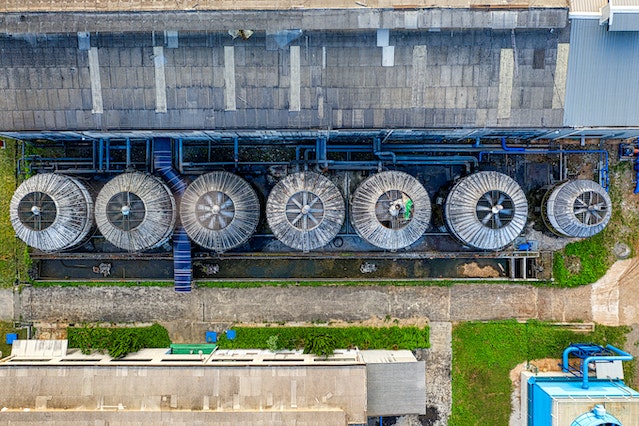
Environmental engineering combines science and engineering principles. The dual purpose is to protect the environment and human health.
With growing populations mostly in cities, there are many challenges for governments and local authorities to make cities more eco-friendly, and a lot of funding is invested here.
Naturally, green industries emerge in need of filling up environmental engineering jobs that are in high demand. Competition is fierce so make sure to check an environmental engineer resume guide before you apply for any of these listed jobs.
In this article, we will explore different job opportunities available for environmental engineers along with their purpose, requirements, and career prospects.
Top 5 Environmental Engineering Jobs to Pursue
1. Green building engineer career
 Green building engineers are experts in the design and construction of sustainable and energy-efficient buildings.
Green building engineers are experts in the design and construction of sustainable and energy-efficient buildings.
What’s the need for green building engineers?
Large buildings aren’t environment-friendly, generally.
A study found that skyscrapers in New York City accounted for 45% of the city’s carbon emissions, despite occupying only 2% of its land. We couldn’t find an equivalent research report for London, but the results can hardly be much different.
Construction companies are facing a question: how to minimize the impact of buildings on the environment? The answer: green building engineers.
Role of a green building engineer:
- Designing renewable energy systems
- Utilizing renewable materials
- Installation of water conservation systems
- Setting up a waste management system
- Design and development of natural ventilation systems
How to get into a green buildings engineering career?
Here are some tips.
- Pursue a degree in Civil Engineering or Environmental Engineering at a reputable university or college.
- Participate in internships at green building firms and environmental organizations to gain hands-on experience.
- Consider pursuing professional certification in green building or sustainable design. Leadership in Energy and Environmental Design (LEED) is US based certification but is accepted globally.
Prospects of a green buildings engineering career
In the UK, the government has set ambitious targets for reducing carbon emissions, including a goal of achieving net-zero emissions by 2050. Construction companies must act fast. The prospects are bright.
2. Water project engineer career
 A water project manager oversees projects related to water management. These projects may involve water supply, treatment, distribution, conservation, or reuse.
A water project manager oversees projects related to water management. These projects may involve water supply, treatment, distribution, conservation, or reuse.
What’s the need for water project engineers?
For context: London needs 2.6 billion liters of water daily.
- London’s tap water comes from a variety of sources, depending on where you live.
- Thames Water, which supplies most of London, draws water from River Thames and River Lee.
- The river water is collected in large reservoirs around the M4/M25 area, where it is stored until it is needed for treatment.
Behind such scenes are hundreds of water project engineers.
Role of a water projects engineer:
- Monitoring water quality, analyzing water supply, and designing distribution systems.
- Ensuring compliance with relevant laws, regulations, and standards.
- Evaluating cost-effectiveness, and environmental impact of various water treatment solutions.
- Besides, they may take an active role in feasibility studies during expansion.
- Water engineers can also be deputed as consultants advising upcoming water treatment plants in different municipalities.
How to get into a water project engineering career?
Here are some tips.
- Enroll in a higher education program to earn a degree in civil engineering or a related field.
- Focus on coursework related to fluid mechanics, hydrology, and environmental engineering.
- Obtain a Master’s degree if possible followed by certification from the Chartered Institution of Water and Environmental Management (CIWEM).
The prospects of a water projects engineering career
The nation’s aging water infrastructure means that the demand for water project engineers is likely to remain high for the foreseeable future.
Moreover, the UK government has pledged to invest £5.2 billion in flood defenses which will create hundreds of new jobs.
3. Wastewater engineering career
 Wastewater is water that has been used for cleaning, washing, and bathing. Due to the high use of detergents, wastewater is harmful to marine life.
Wastewater is water that has been used for cleaning, washing, and bathing. Due to the high use of detergents, wastewater is harmful to marine life.
It must be treated before it can be released.
What’s the need for a wastewater engineer?
A wastewater engineer specializes in the design, construction, and operation of wastewater treatment systems.
To become a wastewater engineer, you need to have a bachelor’s degree in civil or chemical engineering from an accredited university.
Role of a wastewater engineer
- Using wastewater testing equipment and software.
- Collection and analysis of data from sample testing.
- Play an important role in preventing the spread of waterborne diseases.
- Ensuring that the released wastewater does not harm the marine ecosystem.
How to get into a wastewater engineering career?
Here are some tips.
- If possible, take courses in environmental science and geography at O and A levels (in addition to STEM courses).
- You’ll need to obtain a degree in civil engineering, environmental engineering, or a related field.
- Some of the best universities are the University of Sheffield, Imperial College London, and the University of Manchester.
- Opt for internships and co-op programs related to wastewater treatment, water management, and environmental regulations.
Prospects of a wastewater engineering career
The UK government’s Green Jobs Taskforce aims to create 2 million green jobs by 2030. It will develop skilled workers in green industries, including wastewater management.
In addition, organizations such as Water UK and the Chartered Institution of Water and Environmental Management (CIWEM) host job boards.
The commitment to investing in infrastructure projects bodes well for those opting for wastewater engineering jobs.
4. Air quality engineer career
 Air pollution poses the biggest environmental threat to public health in the UK. The number of deaths caused by man-made air pollution in the UK each year is estimated to be between 28,000 and 36,000.
Air pollution poses the biggest environmental threat to public health in the UK. The number of deaths caused by man-made air pollution in the UK each year is estimated to be between 28,000 and 36,000.
What’s the need for an air quality engineer?
Air quality engineers use scientific techniques to analyze and control air pollution. They also work on projects related to reducing outdoor air pollution, such as emissions from vehicles, and factories.
Role of an air quality engineer:
- Managing air quality using monitoring, and chemical analysis,
- Use of computer modeling, and statistical analysis for prediction of air quality.
- Air quality engineers can design and install pollution control equipment like filters, scrubbers, or electrostatic precipitators.
- They work with architects and building designers to ensure indoor air quality is optimal.
- Air quality engineers work in various sectors such as government agencies, consulting firms, and private companies.
How to get into an air quality engineering career?
Here are some tips.
- You will need a relevant undergraduate degree such as environmental engineering, chemical engineering, or mechanical engineering.
- The University of Birmingham offers a course in Air Pollution Management. It is accredited by the Institute of Environmental Sciences (IES) and the Institute of Air Quality Management (IAQM).
- UWE Bristol offers a suite of short courses on Air Quality Management, Monitoring, Modelling, Assessment, and Action Planning.
Prospects of air quality engineering career
The UK government and industry are investing heavily in clean air initiatives. The demand for air quality engineers is expected to grow in the coming years. That’s because the importance of clean air and environmental sustainability becomes apparent.
5. Solar engineer career
 A solar engineer is a professional who specializes in using sunlight to generate electricity. The field is very closely related to renewable energy engineering.
A solar engineer is a professional who specializes in using sunlight to generate electricity. The field is very closely related to renewable energy engineering.
What’s the need for solar engineers?
They design equipment that generates electricity from sunlight. These include photovoltaic cells, solar panels, inverters, batteries, and controllers.
The average cost of photovoltaic cells has decreased dramatically from about $76 per watt in 1977 to about $0.38 per watt in 2019. This is due to technological advances formulated by solar engineers.
Role of a solar engineer:
- They plan, design, and execute solar energy projects.
- They research and create more cost-efficient solar energy cells.
- Design and optimize solar energy systems and processes.
- Communicate effectively with clients, stakeholders, and the public about project benefits.
How to get into a solar engineering career?
Here are some tips.
- You need to have a bachelor’s degree in engineering from a university in a field related to solar energy, such as mechanical, or electrical.
- Consider admission to universities offering specialized solar engineering programs such as the University of Surrey and the University of Southampton.
- Seek apprenticeships at firms manufacturing and installing solar energy equipment. Hands-on knowledge of fabrication will be handy when you seek a job.
Prospects of solar engineering career
There is an increasing demand for renewable energy. Solar energy is an important part of the UK’s energy mix and its transition to net zero emissions by 2050.
Solar engineering is a rewarding career that helps protect the environment and reduce greenhouse gas emissions.
Wrapping Up
According to Glassdoor, the average pay stands at £33,700 in London.
Environmental engineers earn less than software engineers. However, the pay is competitive when compared with that of civil and mechanical engineers. For those passionate about sustainability and reducing the impact of climate change, the job can be incredibly rewarding.
![]()
Author Profile
- Online Media & PR Strategist
- Blogger and Educator by Passion | Senior Online Media & PR Strategist at ClickDo Ltd. | Fascinated to Write Lifestyle Blogs in News & Education I have completed a journalism summer course at the London School of Journalism and manage various blogs.
Latest entries
 LeisureApril 16, 202510 Best Green UK Hotels for Eco-Tourists
LeisureApril 16, 202510 Best Green UK Hotels for Eco-Tourists Best practicesApril 14, 20258 Best Ways to Reduce Your Carbon Footprint
Best practicesApril 14, 20258 Best Ways to Reduce Your Carbon Footprint Green Expert GuidesMarch 28, 2025Lisbon Living: Where Sustainable Charm Meets Urban Energy
Green Expert GuidesMarch 28, 2025Lisbon Living: Where Sustainable Charm Meets Urban Energy EnvironmentJanuary 21, 2025Buying Eco-Friendly Homes: 6 Eco Questions to Ask Your Real Estate Agent
EnvironmentJanuary 21, 2025Buying Eco-Friendly Homes: 6 Eco Questions to Ask Your Real Estate Agent






Leave a Reply
You must be logged in to post a comment.